News
At the start of the year we spoke with Steve Hartley about his experience as a foreign entrepreneur in Slovenia, an Australian who runs Explorer Kids Summer Camps. Now, after another successful season and going into the winter, we spoke to him again about summer camps for children in Slovenia, and the potential that’s still there in this relatively undeveloped market in an ideal location for getting away from it all.
Summer camps are an 18$ billion industry in the US, with over 14,000 camps and 14 million children attending every year. How does that compare to the European market?
It’s a bit like comparing apples and oranges really as there are so many variables involved. Clearly though there is a much greater camping tradition in the US when compared to Europe, though does that mean camps are unpopular here?
The bottom line is that summer camps in the US are a tradition, a way of life. In many ways it’s become so engrained in popular culture that it’s just a given that children do this during their summer holidays. Well, at least those children from families that can afford to send their sons and daughters off to camp for eight weeks straight.
In saying this, it’s foolish to say that summer camps aren’t popular in Europe because they are. Just not to the same extent as in the US, nor in the same way. For example the Scouting Association is present in 40 of the 50 European countries, while there’s a large number of language-based camps found in places like the UK, Spain, France, and even Croatia. It has to be said though that Europe has a lot of ground to catch up to reach the dizzying heights of summer camps in the US.
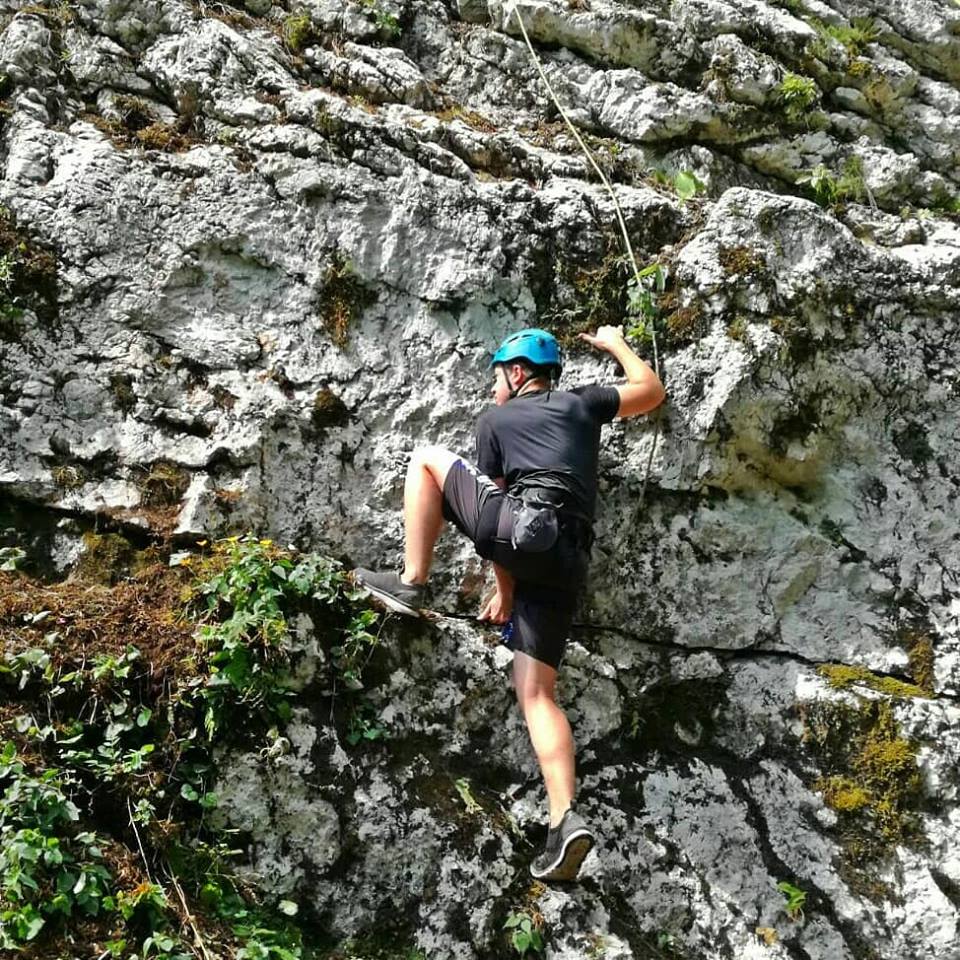
Photo: Explorer Kids Camp
What makes summer camps in the US different to those you generally find in Europe?
Looking at what those in the American camping industry say, the majority of summer camps there are far less focused on traditional education and are more centered on strengthening and developing skills, such as Emotional Intelligence, not commonly taught in the classroom. On paper they’re also much longer, ranging from four to eight weeks in length, whereas in Europe it’s not common to find camps that last longer than two weeks.
When delving further, the American Camp Association emphasizes “exposing campers to different cultures” as a key factor of US based camps, as they see this cross-cultural experience as vital for their children’s growth. Even though this is becoming more popular now in Europe, with such programs as ERASMUS and some international camps, it still isn’t a deep tradition like you see in the US.
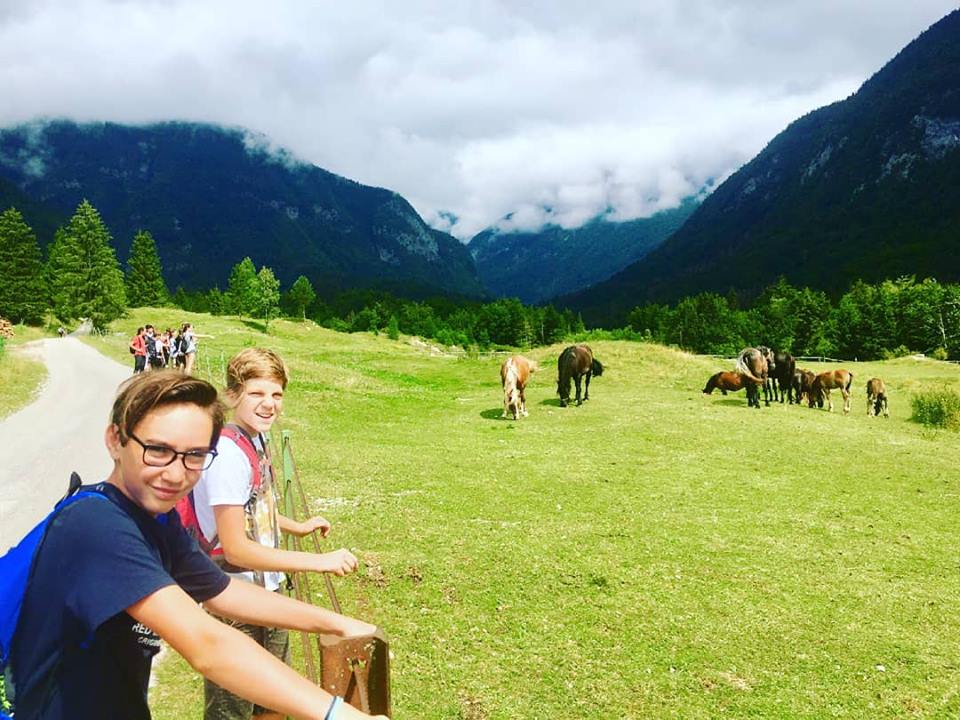
Photo: Explorer Kids Camp
They also aim to develop community skills in the campers. Many camps (the American Camp Association says over half) offer some kind of community service program, such as clean-ups or community food drives in their curricula. It ties into exposing campers to different cultures, while also building Emotional Intelligence which they deem so important to their values.
Slovenian summer camps can learn much from the American experience
One can perhaps get the biggest insight into how camps work in the US by looking at what the parents see as advantages of sending their children to camps. According to the American Camp Association the benefits for parents were reported as having a safe environment that builds self-confidence, esteem and social skills, and encourages friendships, while increasing children’s willingness to experiment and try new things.
Again, there’s a distinct focus on building Emotional Intelligence in camps in the US as it’s now widely regarded as a better indicator of success than what you find with IQ. This focus on building EQ is something that isn’t often seen in feedback from parents in Europe as a society is still much more focused on building IQ for schools and life.
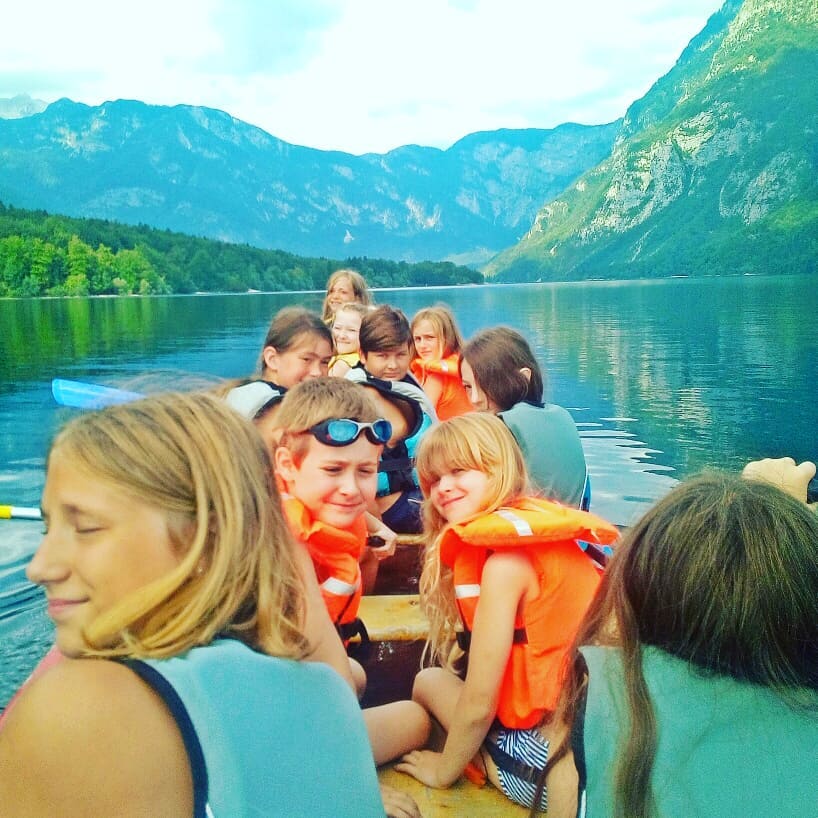
Photo: Explorer Kids Camp
You’ve been running camps in Slovenia for over 10 years. How have they evolved over that time?
Slovenia has always had a pretty rich camping history, especially when you take into account its abundance of nature and outdoor activities. Not only are the Scouts quite popular, but you also have the Taborniki which some might say is a mellow younger sister of the Scouts. Adding to that there are many specialized camps for at-risk children, language learning, and also some sport-based camps in both summer and winter. Of course, you also have your traditional school camps which are a regular part of the school curricula.
In saying all of this, the vast majority of these camps are predominately done only with Slovene children and staff, meaning there’s a lack of “exposing campers to different cultures”. Poletni Taborni was perhaps the pioneer in this field, having run international camps in Slovenia for the past 11 years, and with the recent tourist boom there’s a distinct growth in foreign children attending summer camps in Slovenia.
When compared to the traditional ‘life skill based’ US camps, that’s something that hasn’t quite caught on yet in Slovenia. One could argue that the Scouts and Taborniki are groups that teach some of these skills, although they’re still some way off what you’ll find in the States, especially when it comes to building EQ. Quite simply, when camps aren’t seen as big business, as you see in Slovenia, they tend to lack the same professionalism and day-to-day organization that you see across the Atlantic.
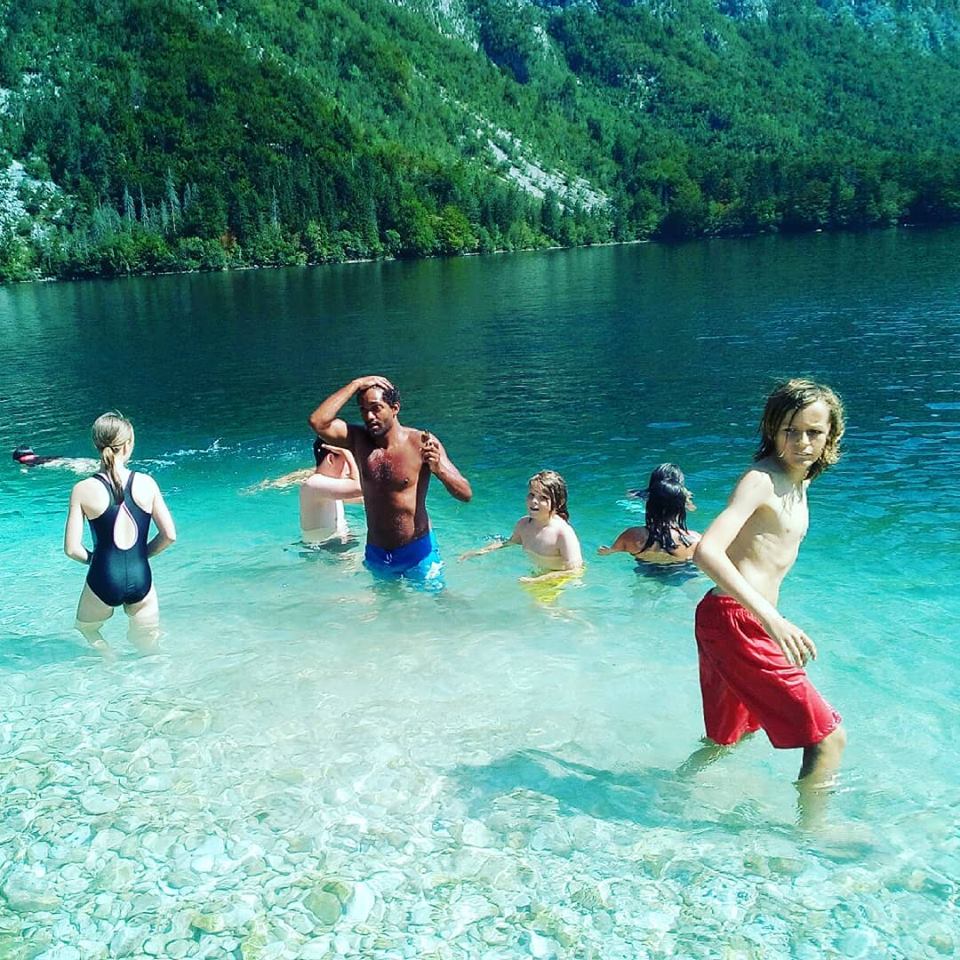
Photo: Explorer Kids Camp
You established Explorer Camps four years ago, and they have grown over 320%, with 2019 looking to be even bigger. What’s behind this success?
Identifying one clear reason behind our present success is difficult, as it’s been a combination of many different factors. Without doubt the fact we are a true international camp with children coming every year from over 18 different countries is a big draw not only within Slovenia, but also in this region. It’s something unheard of in Slovenia to have 45 children on camp, with only three Slovenes, and while the rest of the campers come from as far as Australia, China, UAE, Ireland, Russia, Latvia, Malaysia, and the US to name a few. You can then also add having the bonus of English native-speaking stuff that run 100% of the activities.
Some may point to our desire to step away from a school like atmosphere by focusing on outdoor activities that are fun and engaging as a key point. It’s definitely an amazing experience being challenged to try something you’ve never done before. However, behind this fun there’s a strong belief in building EQ amongst our camp community, whether it be during our outdoor activities, free time or even meals.
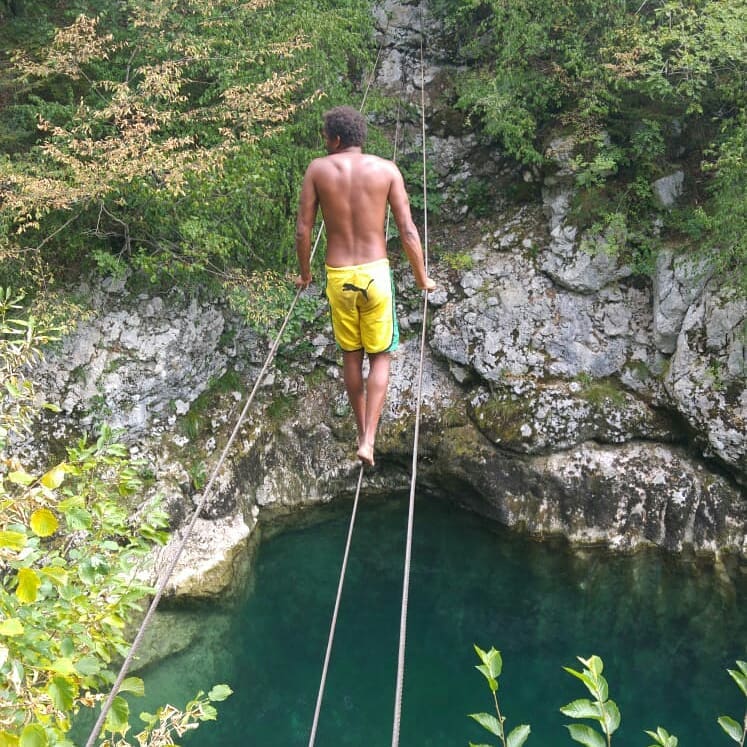
Photo: Explorer Kids Camp
You could add to this the open and caring environment we create where children can feel free to express themselves without fear of judgment as being a good reason behind their success. It’s not often campers can totally relax and enjoy just being who they are.
Counsellors are the key to a successful summer camp
Personally, the biggest factor of our success is our staff. Across the board campers repeatedly talk about the counselors and their warm, caring, and personal approach to working with them as being the biggest reason for enjoying the camps so much. It’s a unique opportunity for campers to simply be themselves, and to learn to love who they are rather than trying to be someone they’re not.
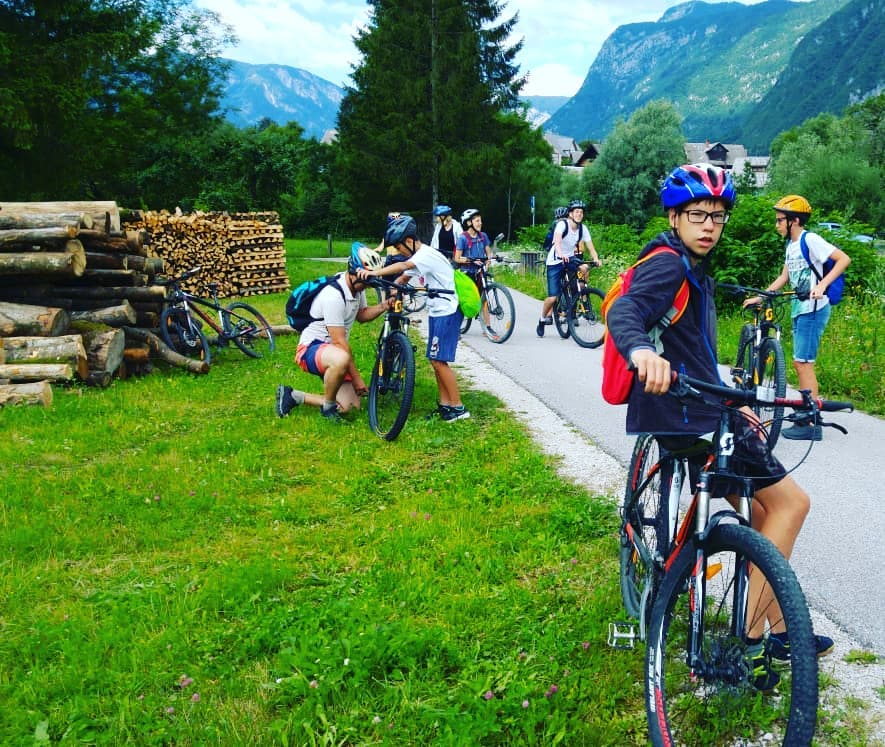
Photo: Explorer Kids Camp
You mentioned campers come to Slovenia from all around the world. What are their impressions of the country?
It’s safe to say that they really love Slovenia, and our camps, when you take into account that nearly 80% of our campers come back every year. Without doubt they’re impressed by the beauty of Slovenia as the nature around Lake Bohinj, our previous location, really is something else. I think it’s also the fact that they experience the outdoors rather than just observe it which creates and even more special bond between the campers and nature here. Whether it be on the water in canoes or kayaks, hiking in the mountains, riding horses through forests, or flying through the air they are always challenged to step out of their comfort zones while being totally in nature.
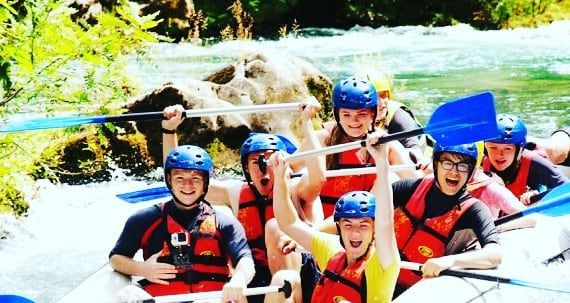
Photo: Explorer Kids Camp
As you pointed out, campers come away with life-long memories. What are some of your best moments from camp?
Over the years there have been so many magnificent memories, if I’m honest it’s quite difficult to pin point one. Quite often campers come to us lacking in self-confidence, self-belief, and generally feeling negatively about themselves, so it’s extremely rewarding seeing them grow in stature leaving happy and more in love with who they are, rather than who they’re told to be. The feeling of staying in touch with these campers year after year and seeing them grow as human beings is unbelievably satisfying, especially on those occasions those campers come up and thank us for all we did with them.
A supportive environment gives children the confidence to grow
In saying this, perhaps the most memorable moment came from my very first camp in Slovenia, as it set the tone for the next 15 years, and also became the cornerstone for Explorer Camps. A young camper was in need, but was at a loss at how to express himself or to get others to understand his pain. By taking the time to listen, the staff helped him find his voice and show his emotions, not only for the first time at camp, but also at that time in his life, which resulted in him not only enjoying the camp but also being more relaxed and happy at home. His parents were extremely grateful to us for making this difference, and as a result this empathy and care shown towards campers forms an integral part of our camp philosophy. We aim to make a difference to every camper’s life.
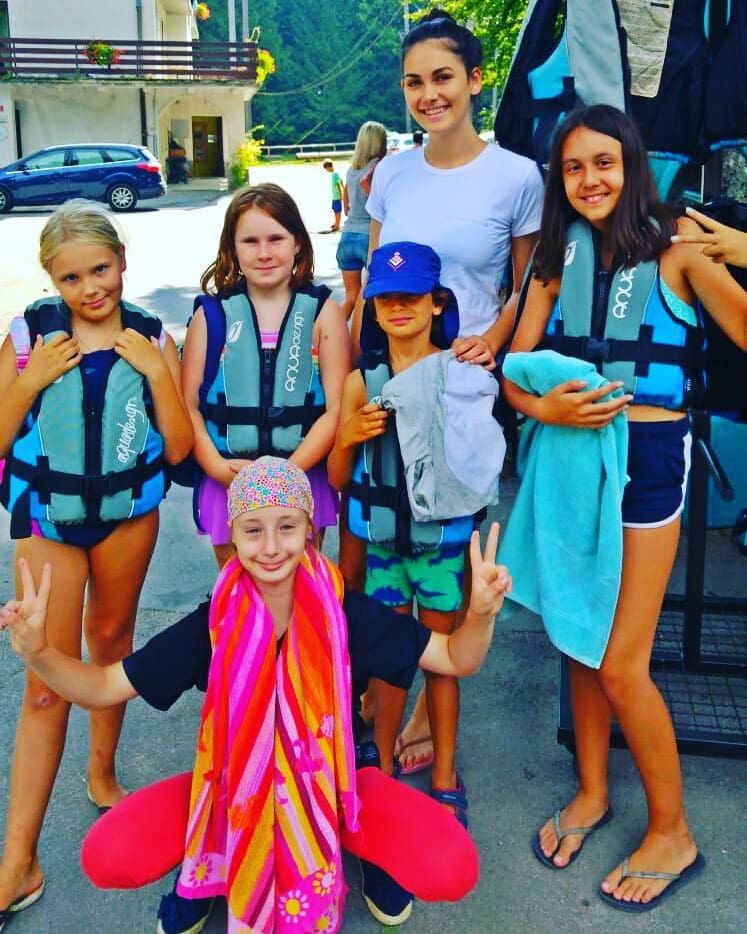
Photo: Explorer Kids Camp
Do you think there’s a place for summer camps in Slovenia and Europe in the future?
It’s a funny question if I’m honest, as I believe camps will always have a place in Slovenia and Europe. However, a lot needs to be done to ensure that they reach the extremely high levels set in the US, which I believe should be our goal. Education is more than just the pursuit of IQ, as Emotional Intelligence is a growing force worldwide and becoming increasingly recognized as a true indicator of success. Without doubt we’ll be pushing hard at Explorer Camps to ensure children that come to us walk away not only being happier with themselves, but also understand more about EQ and its value.
You can read our earlier interview with Steve Hartley here, visit the Explorer Camps website here, follow them on Facebook, or watch more of their videos on YouTube. And if you’d like to share your story about running a business in Slovenia, or about anything else related to the country, then please get in touch at This email address is being protected from spambots. You need JavaScript enabled to view it.
STA, 29 November 2018 - Slovenia's bobbin lace-making, a traditional lace-making technique using special wooden sticks - bobbins, has made it to the UNESCO list of intangible cultural heritage.
The decision was taken on Thursday by the UNESCO Intergovernmental Committee for the Safeguarding of the Intangible Cultural Heritage, as it is meeting in Port Luis, Mauritius, the Slovenian Culture Ministry said in a release.
Slovenia formally nominated this special technique of making delicate lace in March 2017. The tradition is especially strong in the north-west, around Idrija, Cerkno and Škofja Loka.
In recent years, it has been revived and turned into a popular activity, with 120 associations and groups dedicated to lace-making around Slovenia.
In Idrija, there is for instance a bobbin lace-making school and the town also organises an annual festival dedicated to this craft.
In 2016, bobbin lace-making was declared cultural heritage of national importance, which is also a condition for nominations with UNESCO.
The nomination file was prepared by a number of institutions such as the Slovenian Ethnographic Museum and other museums from Idrija, Ljubljana and Škofja Loka, as well as associations and groups involved in bobbin lace-making.
The ministry considers the listing a special recognition of this art which has been handed down from generation to generation, binding children, adults and the elderly.
Bobbin lace-making used to be an important economic activity, for which reason it has survived, the ministry said.
Nowadays its role has changed to become a favourite pastime for retired women, children and youth, with men usually helping with making bobbin lace-making tools.
It is moreover an inspiration for fashion designers, industrial designers, contemporary visual artists and architects, and is used for plate decorating.
Bobbin lace is the fourth item of Slovenia’s cultural heritage on the list
The elements of the UNESCO list of intangible cultural heritage of humanity, the list of intangible cultural heritage in need of urgent safeguarding and the registry of best practices are deemed as significant bastions of humanity's intangible heritage, the highest honour for intangible heritage in the world.
The lists were established in 2008 when the 2003 Convention for the Safeguarding of the Intangible Cultural Heritage took effect. Slovenia ratified it in 2008 and set up the national registry of intangible cultural heritage the same year, which currently contains 66 units.
Slovenia's other entries on the UNESCO list of intangible cultural heritage are the door-to-door rounds of Kurents, a traditional Slovenian carnival costume, (since December 2017), the Škofja Loka Passion, the mass staging of an early 18th-century play (since December 2016), and since yesterday, dry stone walling, the ancient building method used in Slovenia, Cyprus, Greece, Bulgaria, Croatia, Italy, Switzerland, France and Spain.
Other stories about Slovenia’s cultural heritage are here
STA, 29 November 2018 - A former Ljubljana primary school headteacher has been put on trial for banning two male final year students from school grounds after they sexually harassed a pair of their female classmates.
According to a report in the newspaper Dnevnik, Dušan Merc, the former headteacher of the Prule primary school, is facing charges of negligence at work for violating the two boys' right to education.
The case goes back five and a half years when two year 9 Prule students harassed their classmates in a swimming pool during a sports day.
After pushing them under water several times to the point of exhaustion, they sexually attacked the girls and later even made fun of them on school premises.
Five days later, after the marking period was over, Merc banned the boys from school grounds in order to protect the victims.
Merc has support from the public and school board
The public sided with the headteacher, but a schools inspector found he acted against the rules and he demanded the school board to dismiss him, which the board refused to do.
However, the inspector's findings were taken up by the state prosecution, which filed charges against Merc. The trial started at the Ljubljana Court on Wednesday, but the judge closed it to the public due to the involvement of underage witnesses.
While the prosecutor would not comment on the case, Merc's defence counsel Andrej Razdrih told Dnevnik that this was the first time in his career that he had come across such a case.
"My client acted correctly, professionally and in a highly ethical manner," he said, blaming the trial on the personal grudge and frustration of the schools inspector.
In his plea address, Merc said that the inspection oversight in the case went on for eight months, from August 2013 to April 2014, but that the inspector never told him what he was investigating so he was unable to respond to the charges.
He said that by "suspending" the two students for three days just before the end of the school year he did not violate their constitutional right to education, but only banned them from school premises and from attending the final outing and the annual awards ceremony on the final day of school.
"My reasoning was that the victims should not meet the perpetrators again and that the school would not put up with such conduct and violence," Merc said, adding that he protected the victims from potential further sexual harassment and ridicule.
STA, 29 November 2018 - All seven suspects charged with running illegal call centres operated by trafficked Taiwanese citizens pleaded not guilty to charges of human trafficking at a pre-trial hearing at the Maribor District Court on Thursday.
The three Slovenians and four citizens of Taiwan are suspected of unlawfully detaining at least 63 people, mostly citizens of Taiwan, in several underground call centres in Slovenia and Croatia.
Six of the seven defendants remain in custody due to flight risk.
The trial is the result of a police sting in January. The subsequent investigation revealed that the call centres had been operated since November 2015. Illegal proceeds are estimated at EUR 370,000.
Related: China calls on Slovenia to surrender Taiwanese detained in phone scam
The prosecutor offered plea bargains in exchange for prison sentences of just over three years plus the confiscation of proceeds from crime. The foreign citizens would also be banned from entering Slovenia for five years after they have served time.
The trial is likely to drag on considering the large number of defendants and language barriers.
It hit a snag right at the start, when one of the Taiwanese suspects demanded an interpreter for Taiwanese Mandarin claiming that he did not understand classic Mandarin well enough.
The attorneys for two suspects also demanded exclusion of certain evidence that they claim had been unlawfully acquired in China and Taiwan.
The hearings will continue within 14 days.
The trial comes after more than a dozen house searches were conducted in Ljubljana and Maribor in late January looking into illegal call centres used to perpetrate phone fraud in China. The investigation revealed the call centres were linked with trafficking.
The house searches produced shocking revelations, as 32 victims of trafficking, most of them Taiwanese nationals, were found working in abysmal conditions.
The victims of trafficking were locked up into houses that doubled as call centres and accommodation, they were stripped of their documents, telephones and money, and ordered to perpetrate phone fraud.
They were not allowed to leave the houses even if they wanted to return home. If they did not obey the rules, they were physically and psychologically abused.
The investigation has also revealed the Slovenian handlers worked on instruction from a Taiwanese ringleader who occasionally came to Slovenia but was operating out of Taiwan.
STA, 29 November 2018 - Just 14 months after claiming the title of European champion, Slovenia have been denied a place in the 2019 World Cup after a crushing 82:54 defeat against Ukraine on Thursday.
The seventh defeat in nine games cemented Slovenia's ranking as the worst team in group 1 even as they brought Ukraine closer to the top three spots that come with a ticket to the final competition in China.
Qualifying was always going to be a tall order for the reigning European champions, who have been left without the players that were instrumental in winning the title in Istanbul in 2017.
NBA player Goran Dragić ended his career in the team, the naturalised American Anthony Randolph skipped the qualifications for health reasons, and Luka Dončić was not allowed to play by officials of the Dallas Mavericks, where he has just started his NBA career.
There are three more games to go until the end of the qualifying. Slovenia will take on Latvia in Ljubljana this weekend before finishing the round in February, first on the road against Turkey and in the end at home with Ukraine.
STA, 29 November 2018 - The first reading in the National Assembly of a bill raising the minimum wage by overhauling the way it is calculated indicated that the changes, proposed by the opposition Left with the tentative support of the coalition, are likely to be watered down somewhat during the adoption process.
While all parties agreed the minimum wage, currently at EUR 638 net, was too low, they mostly found issues with the bill.
The motion, coming after basic welfare allowance went up from EUR 297 to EUR 393 earlier this year, would increase the minimum wage by roughly 5% in 2019 and just as much in 2020. In 2021 it introduces a calculation formula that would keep it 20% above minimum living costs.
The main objection raised on Thursday by most coalition parties and the government as it held a correspondence session had to do with to the timeline of the raise, which is closely linked to the exclusion of individual bonuses and allowances from the calculation of the minimum wage.
"A predictable business environment is crucial for the economy in Slovenia, which is why the minimum wage needs to be raised in a well though-out, predictable and gradual way. When considering predictability, it is inappropriate that changes adopted in December 2018 already enter into force in January 2019," the government wrote.
All our stories on Slovenia’s minimum wage are here
It highlighted the need to phase out the bonuses - employers have been including various bonuses into the minimum wage - gradually, arguing "this would give the public as well as private sector enough time to adjust".
While asserting it was in favour of the goals of the proposal, the government reached out to employers, who have been complaining the changes were drafted without social dialogue.
It said that "it would make sense when searching for the most appropriate solutions in the next stages of the legislative procedure to consider social dialogue to the highest extent possible and adjust the enforcement's dynamics for individual solutions".
The proposal in general was rejected only by the opposition New Slovenia (NSi), whose Jožef Horvat said the rise would disrupt the balance of the wage scale, and by the opposition Democrats (SDS) whose Karmen Furman identified a misguided wage policy combined with a misguided social transfers policy as the reason for this disruption.
The two parties also highlighted the absence of social dialogue, while Jerca Korče of the senior coalition Marjan Šarec List (LMŠ) said the Economic and Social Council had had a number of opportunities to discuss a higher minimum wage.
"I have the feeling that the time will never be right for this debate," she said, also rejecting accusations that an effort was under way to revive "an outdated social model" and to meddle in the economy.
"The state has to see the whole picture, which is comprised of both business and the recipients of the minimum wage. Because the wage did not increase on its own, politics assessed it was time to intervene," she said.
Joining the Left in supporting the changes in their current form was the opposition National Party (SNS), whose Dušan Šiško was however simultaneously critical of the raised welfare allowance.
In the end, the bill was endorsed in a unanimous vote with the SDS and NSi abstaining.
Related: Find out the average pay for various jobs in Slovenia
Below is a review of today’s news in Slovenia, summarised by the headlines in the daily newspapers for Friday, November 30, 2018, as prepared by the STA:
DELO
Gene editing
"Genetics minus gene = ethics": The Chinese scientist He Jiankul has announced an unprecedented achievement: he has created genetically modified kids, twin sisters whose genome has been edited to make them resistant to HIV. (front page, 20)
Suicide statistics
"Slovenia's suicide rate dropping": After 2000 the number of people globally who commit suicide declined by 29%, according to data by The Economist. This is precisely the rate of decline that Slovenia registered as well. (front page, 4)
Local elections
"To the mayoral office via sport": In the mayoral run-offs in Maribor, Koper and Kranj, the candidates' attitude to sports infrastructure could be a decisive factor. In Koper, for example, the mayor's love of sports is one of the things which has kept him in office for so long. (front page, 8)
DNEVNIK
Former headteacher on trial
"Former headteacher Merc has broad support": Experts are in agreement that Dušan Merc, the former headteacher of the Prule Primary School, acted correctly when he prevented two students suspected of sexual harassment from entering school, an act for which he is now standing trial. (front page, 2, 18)
Janković trial
"Janković denies any culpability in Gratel trial": Ljubljana Mayor Zoran Janković pleaded not guilty as he appeared in court for a pre-trial hearing in the Gratel case, in which he is charged with taking a bribe from a company to the benefit of the city. (front page, 11)
Local elections
"Popovič and Bržan neck-and-neck": Incumbent Mayor Boris Popovič and his challenger Aleš Bržan are neck-and-neck just days before the mayoral run-off, shows a survey commissioner by Dnevnik, with Bržan having a 0.2-point edge over Popovič. (front page, 9)
FINANCE
Minimum wage
"Everything you have to know about the minimum wage": The minimum wage will gradually increase to EUR 700 under a bill currently in parliament. For now, it remains unclear how the minimum wage will be calculated in January 2019. (front page, 2, 3)
Janković trial
"Janković on trial over 2007 donation. Who donates anything to Ljubljana these days?": Ljubljana Mayor Zoran Janković pleaded not guilty as he appeared in court for a pre-trial hearing in the Gratel case, in which he is charged with taking a bribe from a company to the benefit of the city. Such donations peaked in 2007, by 2017 they were almost gone. (front page, 4, 5)
Economic growth
"What is the impact of the global slowdown on Slovenia?": The Statistics Office will release GDP growth figures for Q3 today. Analysts believe growth will remain brisk, even though September was difficult for exporters. (front page, 4, 5)
VEČER
Local elections
"Drama until the end": In many of the 56 municipalities that will hold mayoral run-offs the situation is tense as the candidates battle, sometimes using dirty tactics, to eke out an advantage. (front page, 10-15)
New army chief
"Women in men's positions": Alenka Ermenc, the new chief of the general staff, is blazing a trail for women across the world. But a closer look at the statistics shows that they are far from posing a threat to male dominance. (front page, 5)
Call centre fraud trial
"They deny having them in bondage": The seven suspects on trial for operating underground call centres manned by trafficked Asians pleaded not guilty in court yesterday. (front page, 21)
Steel company strike
"Striking for higher wages": Workers in three subsidiaries of steel group SIJ staged a token strike yesterday. They demand higher wages as well as a new pay system and are willing to step up activities. (front page, 6)
STA, 29 November 2018 - Mayor of Ljubljana Zoran Janković pleaded not guilty as he appeared in court for a pre-trial hearing on Thursday in the Gratel case, in which he is charged with taking a bribe from a company to the benefit of the city.
"I think I'd be guilty if I hadn't done what I'm charged with," he told judge Vladislava Lunder at the Ljubljana District Court.
The case concerns EUR 500,000 which the mayor demanded from construction company Gratel in March 2007 to allow it to dig roads to install optic cables.
Gratel then transferred two EUR 250,000 instalments to the municipality as a donation for the renovation of Ljubljana Castle.
This enabled it to resume its work under a new development permit after Janković had initially banned Gratel from digging on public premises.
The payment was compensation for the damage incurred by the city because Gratel had dug up wider conduits and installed more cables than agreed.
Janković had already denied the allegation of bribery when the police raided the offices of the municipality and several other locations in February 2014.
His defence counsel Janez Koščak demanded today that evidence obtained in the 2014 house searches be excluded, arguing it had been obtained by violating human rights.
The lawyer explained the relevant court order had not specified the suspected crimes, which made the house searches unlawful.
Upon leaving the courtroom, Janković said he did not understand what prosecutor Blanka Žgajnar wanted to achieve with the indictment.
"A private company has paid compensation because it assessed it had installed too many cables," Janković repeated his view of the case.
He reiterated there was nothing wrong with a company making a donation to a public institution, saying it caused no damage to anyone and nobody except the prosecutor was claiming anything back.
Janković is convinced he is innocent: "I believe I'll prove my justice. They cannot sentence an innocent person."
He told the judge he had came to the courtroom "out of respect for the court", having had a business trip scheduled for today, which means he could have avoided it.
The main hearing in the Gratel case will start on 3 January.
Janković has another trial coming up soon, where he faces allegations of fraud concerning EU funds for the Stožice sports complex project.
While the trial starts next week, the pre-trial hearing for him is scheduled for 12 December.
Jankovič, who has led Ljubljana since late 2006, is also subject to criminal proceedings in several other cases.
STA, 29 November 2018 - Slovenia has been fixated on Maribor and Koper as local elections enter the run-off on Sunday. Maribor will get a new mayor in any case and in Koper the incumbent faces the biggest challenge of his career. But there are plenty of other races that could produce surprises as well.
In Maribor, Slovenia's second largest city, former mayor Franc Kangler, the candidate of the right, and businessman Saša Arsenovič, an independent running on the Modern Centre Party (SMC) ticket, are neck-and-neck with just days to go until the polls open.
The latest poll by Večer, the Maribor-based daily, puts Arsenović less than two points ahead of Kangler, but the race is too close to call. In the first round, Arsenovič was well ahead, with 38.2% to Kangler's 31.4%.
While the campaign ahead of the second round shifted a gear lower from the tense and at times aggressive campaigning for the second round, the race is lively given that the candidates represent two very distinct visions of Maribor.
The more urban Arsenovič, a businessman credited with helping to revive the struggling centre of the city, looks up to the long-term mayor of Ljubljana, Zoran Janković, as he tries to infuse town hall with a bit of business acumen.
Kangler, a former police officer and MP who was ousted as mayor in 2012 in mass protests sparked by allegations of corruption, has a can-do attitude but connects better to Maribor's suburban and rural population with his populist, salt-of-the-earth rhetoric about returning the city to its industrial glory.
The race in Koper, the biggest city on the coast and home to Slovenia's sole seaport, pits incumbent Mayor Boris Popovič, who has run the city with a penchant for strong-arming for 16 years, against radio host Aleš Bržan.
It had been widely expected that Popovič would be a shoo-in for his fifth term, but he has spent years fending off corruption allegations, and spent months in courtrooms, sometimes for cases that became statute-barred in odd circumstances.
Local political pundits say the people appear to have become fed up with his authoritarian style, hence the shift to the mild-mannered Bržan, who has led a low-key campaign while letting Popovič defend his record in office.
Popovič edged Bržan by almost 14 points in the first round, but since then nine unsuccessful candidates, who together accounted for nearly a fifth of the first-round vote, jointly backed Bržan. There have been no polls for Koper ahead of the run-off so far.
Another major race is in Kranj, the centre of the wealthy Gorenjska region, but polls suggest the result will be more clear-cut.
Matjaž Rakovec, the former boss of insurer Zavarovalnica Triglav who is running with the support of the Social Democrats (SD), is expected to carry the mayorship easily against independent Zoran Stevanović, a prominent councillor.
Both focused their campaigns on buttressing the city's economy, with Rakovec pledging to bring over a thousand jobs to the city under his watch. Rakovec is projected to win about 70% of the vote, according to a poll carried by Dnevnik.
In the absence of local polling it is difficult to gauge many other races under way in the 56 municipalities that are holding run-offs, but many are interesting merely by virtue of the illustrious and industrious candidates on the ticket.
In Jesenice, which vies with Kranj as the economic centre of Gorenjska, incumbent Tomaž Mencinger has had to surprisingly enter a run-off against Delo journalist Blaž Račić. In the first round, they were neck-and-neck at just over 23%.
In the nearby Tržič, the incumbent Borut Sajovic faces former mayor Pavel Rupar, who is attempting his second return to politics after spending time in prison for defrauding the municipality and who became a tabloid sensation after phone conversations with a mistress were published in 2006.
In southern Slovenia, all eyes are on Črnomelj, where a local member of the opposition Democrats (SDS) managed to enter the run-off with a staunchly anti-immigrant agenda, ousting the incumbent Mojca Čemas Stjepanovič in the process.
But the real surprise there was Andrej Kavšek, a local businessman who carried 45% of the vote with a distinctly pro-business platform emphasising the need to revive the economic fortunes of the community.
In Kamnik, the party of Prime Minister Marjan Šarec, who served two terms as mayor there, faces a major test. Its candidate, deputy mayor Igor Žavbi, finished neck-and-neck with New Slovenia (NSi) candidate Matej Slapar, another deputy mayor.
Smaller communities scattered around the country could deliver surprises as well, as many famous and infamous candidates are on the ticket.
Journalists Bojan Traven in Bohinj and Dejan Karba in Ljutomer are in the run-off. Disgraced former ambassador Milan Balažic will try his luck in Moravče east of Ljubljana, and Roman Leljak, a former convict and amateur historian well liked in conservative circles, is in the run-off in Radenci in the east.
Overall, the second round is much more local since only mayoral run-offs are held and parties at the national level have mostly stayed out of campaigning, which dovetails with the increasingly pronounced trend of established parties giving way to independent and semi-independent local lists in local elections.
In the first round, independents carried well over half of all mayor offices and as a bloc they are the strongest contingent in municipal councils.
All of our local elections coverage can be found here
The Guardian (UK) reports that Branko Zdravkovic, a Slovenian man working as a waiter in London, hanged himself earlier this year while being held in an immigration detention centre.
As the paper writes: “The Home Office said he was facing administrative removal because he was not exercising his treaty rights to work in the UK. But his lawyers dispute that claim, saying that, while his schedule was not always predictable, he worked for many of his eight years in London as a waiter in establishments including the House of Lords, the Guildhall and the Gherkin.”
Mr Zdravkovic was original taken into custody in late March 2017 after his partner, Nicola Sanderson, called the police based on concerns about his drinking and mental health, hoping that he would then receive medical assistance. Instead he was taken to an immigration detention centre.
Four days after entering the Verne Immigration Removal Centre in Portland, Dorset, he was put under suicide and self-harm monitoring, due to his distress at being held. However, when Ms Sanderson went to visit Mr Zdravkovic on April 9, she was told that he had killed himself the previous day.
The death is one of 11 in UK immigration detention centres in 2017, the highest annual total on record. While more information is available at Inquest, as yet there have been no explanations as to why Mr Zdravkovic, an EU citizen, was being held in such a centre, or whether the Slovenian Embassy had been informed of his detention.
STA, 27 November 2018 - The Zois Prizes for outstanding achievements in science were handed out in Ljubljana on Tuesday, with theoretical physicist Boštjan Žekš and historian Milica Kacin Wohinz receiving the life-time achievement accolades. For the first time ever, the Puh Prize was also given out today. It went to Franc Vodopivec, a metallurgy expert.
Žekš worked at the Jožef Stefan Institute, taught biophysics at the Ljubljana Medical Faculty and served as the dean of the Nova Gorica University, the prize panel of the Ministry of Education, Science and Sport noted ahead of the award ceremony at the Cankarjev Dom culture centre.
He was admitted into the Slovenian Academy of Sciences and Arts (SAZU) in 1987. He served as the academy's head between 2002 and 2008.
The 78-year-old made great contribution to the progress of the fields in which he worked, lectured in research centres around the globe and held opening lectures at major international science conferences.
Kacin Wohinz, 88, worked at the Contemporary History Institute in Ljubljana, also serving as its head between 1979 and 1983. Her research focused on the history of Primorska, above all the assimilation of the Slovenian minority in Italy.
She published in a number of scientific journals and wrote several books about assimilation to which Slovenians in Primorska and Croats in Istria were subjected during Italian occupation between 1918 and 1920, as well as their efforts to resist Fascism between 1920 and 1941.
The Zois Prizes are named after Baron Žiga Zois (1747-1819) and have been presented annually since 1998 on the day this patron of arts and science was born.
Named after inventor-come-industrialist Janez Puh (1862-1914), the founder of the Austria-based Puch manufacturing company, the Puh Prize is given out for inventions, development achievements and the use of scientific findings in innovation.
In previous years, the government's panel in charge of science awards only gave out Puh Recognitions. Tonight, the first Puh Prize for lifetime achievement went to metallurgy expert Vodopivec.
He left an indelible mark in the industry and in the academia and helped introduce a number of changes that contributed significantly to the development of the industry.
Vodopivec moreover had great influence on investments in the steel industry and aluminium production, the panel added.





